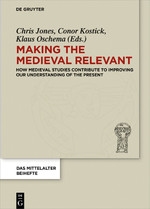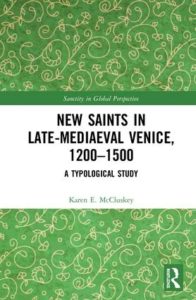 Congratulations to current ANZAMEMS president Chris Jones on the publication of a new collection, Making the Medieval Relevant: How Medieval Studies Contribute to Improving our Understanding of the Present (De Gruyter, 2019) co-edited with Conor Kostick and Klaus Oschema. The volume also includes a contribution from ANZAMEMS member and Parergon Reviews Editor Hélène Sirantoine.
Congratulations to current ANZAMEMS president Chris Jones on the publication of a new collection, Making the Medieval Relevant: How Medieval Studies Contribute to Improving our Understanding of the Present (De Gruyter, 2019) co-edited with Conor Kostick and Klaus Oschema. The volume also includes a contribution from ANZAMEMS member and Parergon Reviews Editor Hélène Sirantoine.
When scholars discuss the medieval past, the temptation is to become immersed there, to deepen our appreciation of the nuances of the medieval sources through debate about their meaning. But the past informs the present in a myriad of ways and medievalists can, and should, use their research to address the concerns and interests of contemporary society.
This volume presents a number of carefully commissioned essays that demonstrate the fertility and originality of recent work in Medieval Studies. Above all, they have been selected for relevance.
Most contributors are in the earlier stages of their careers and their approaches clearly reflect how interdisciplinary methodologies applied to Medieval Studies have potential repercussions and value far beyond the boundaries of the Middle Ages. These chapters are powerful demonstrations of the value of medieval research to our own times, both in terms of providing answers to some of the specific questions facing humanity today and in terms of much broader
considerations.
Taken together, the research presented here also provides readers with confidence in the fact that Medieval Studies cannot be neglected without a great loss to the understanding of what it means to be human.
Making the Medieval Relevant is available for open-access download here: https://www.degruyter.com/view/product/489086. Open access is supported by funding from the British Academy, the Mediävistenverband e.V., the University of Canterbury (NZ) and the Ruhr-University Bochum (Germany). The book will be discussed on the Pat Kenny show on Irish radio network Newstalk, which will later be released as a podcast.
ANZAMEMS members wishing to promote their research through the ANZAMEMS newsletter are invited to email the editor, Lisa Rolston.

